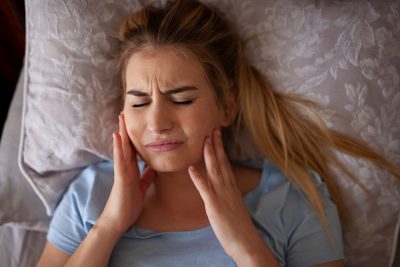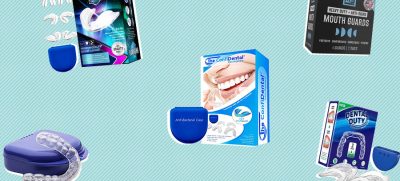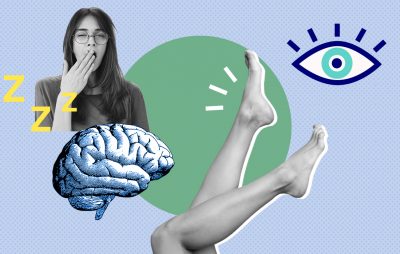Causes and Solutions Behind Jaw Clenching and Teeth Grinding in Sleep
- by Brooke Williams
- Updated: June 29, 2023
Table of Contents

Teeth grinding or jaw clenching, also known as bruxism, is a condition in which a person grinds or clenches their teeth, either during sleep or unconsciously while awake. The condition can be found in both children and adults.
Teeth grinding in sleep in particular is known as sleep bruxism. But if you sleep alone, you may not even be aware that you have the condition. So how are you supposed to know if you’re afflicted with this rather common movement disorder? We’ll go over some of the causes and symptoms and what to do if you suspect that you suffer from sleep bruxism.
What Causes Jaw Clenching And Teeth Grinding In Sleep?
While the causes of bruxism are not fully understood, there are certain risk factors that seem to make some people more prone to teeth grinding in sleep than others.
Breathing Problems
“There seems to be a high, high correlation between bruxism and sleep breathing problems at nighttime, which results in poor sleep,” says Dr. David Cook, a dentist based in the Minneapolis/Edina area whose specialities include clenching and grinding. “We know that bruxism disrupts sleep and the more the sleep is disrupted, the more you brux.”
Research shows that the healthiest way to breathe is through the nose, often referred to as nasal breathing. But people who brux during sleep often breathe through their mouth, which can lead to an array of health problems.
Mental Health Disorders/Medical Conditions
Anxiety – Stress and anxiety can be significantly related to teeth grinding in sleep. Job-related stress, in particular, is thought to be a significant risk factor. Awake bruxism is also tied to emotional responses, such as anger and frustration.
Depression – Depression is also thought to be a risk factor for bruxism. However, one recent study found that while stress and anxiety are associated with both sleep and awake bruxism, depression is only associated with awake bruxism.
Sleep Apnea – Bruxism often coexists with other sleep disorders, such as sleep apnea. In fact, obstructive sleep apnea appears to be the most significant risk factor for bruxism out of all sleep disorders.
Age-Related Illness – Awake bruxism is sometimes found in certain illnesses common among the elderly, such as dementia, Alzheimer’s, and Parkinson’s disease.
Medications
Jaw clenching or teeth grinding in sleep can be a side effect of the following commonly prescribed medications.
Fluoxetine – Also commonly known as Prozac, fluoxetine is often prescribed to treat depression.
Venlafaxine – Also known as Effexor, venlafaxine can be used to treat depression, generalized anxiety disorder, social anxiety disorder, and panic disorder.
Sertraline – Also known as Zoloft, sertraline is used to treat depression, obsessive-compulsive disorder, premenstrual dysphoric disorder, post-traumatic stress disorder, and social anxiety disorder.
Antipsychotics – According to medical research, antipsychotics can cause bruxism because of their inhibitory effect on dopamine-2 receptors.
Typically, when bruxism is a side effect of medication, symptoms will occur within three to four weeks of the first dose. However, symptoms may occur after just a few doses. Likewise, if you stop taking the medication, it usually takes three to four weeks for symptoms to cease.
If you suspect bruxism is the result of certain medication you are taking, consult with your doctor to see if the dosage can be adjusted or whether your physician can make other recommendations.
Lifestyle Choices
Smoking – Some research indicates a strong association between smoking and bruxism. One study found “heavy smokers were more than twice as likely to be weekly bruxers compared with never-smokers.”
Drinking Caffeinated Beverages – Drinking caffeine in the hours before bedtime not only interferes with sleep quality, it can also lead to increased bruxism. One study found the odds for sleep bruxism increased almost 1.5 times for heavy coffee drinkers (those who consume more than 8 cups in a day).
Alcohol Consumption – The same study found a high association between alcohol and sleep bruxism.
“Alcohol can be a contributing factor that affects the quality of sleep,” says Cook. “Anything that affects sleep will have an impact on [bruxism],” he noted.
How Do You Stop Jaw Clenching and Teeth Grinding While Sleeping?
Practice Stress Management
“People can self manage at home. Reducing stress and better sleep will reduce the clenching and grinding,” says Cook. “I don’t think it goes away, but it’ll make it a much more manageable level,” he added.
Practicing stress management like yoga, meditation, or mindfulness exercises may reduce the frequency of both sleep and awake bruxism.
Wear A Mouthguard
Using a mouthguard or other dental appliance is a common way to manage jaw clenching or teeth grinding in sleep. Most of the time your dentist can fit you for a guard during a routine visit, or you can buy a cheaper alternative at your local general store and fit it yourself. You’ll then sleep with the mouthguard when you go to bed, and it will serve as a protective barrier when clenching your jaw or grinding your teeth.
“There’s not one that works for everybody,” says Cook. “Some of the safest ones are made out of hard acrylic—they are custom fabricated. They fit on the lower jaw and they protect the teeth,” he explains. Cook also notes that while he can’t prevent teeth grinding and jaw clenching, mouthguards are a good way to make sure the jaw and teeth are as supported and protected as possible.
Get Botox Injections
There is research to support that repeated Botox injections can be an effective treatment method for sleep bruxism. One research study notes “botox therapy seems promising and beneficial in the treatment of nocturnal bruxism, although several limiting factors such as high cost and the necessity for repeated injections prevent its widespread use.”
Cook notes that it’s often not the first treatment option he recommends because it has to be repeated. However, it can be a beneficial treatment for some. “A lot of people report relief,” says Cook. “It doesn’t work for everybody. But it is in our arsenal.”
Work With A Therapist
Cook says he works with a range of therapists who can assist patients who brux. For instance, he may refer his patients to see a physical therapist, myofunctional therapist, or behavioral psychologist.
“We have a behavioral psychologist that’ll help people identify things they do during the day that make it worse and things they can do to make it better,” says Cook.
A physical therapist may be able to assist with pain, and a myofunctional therapist assists people in proper breathing and improving the function of their tongue and facial muscles. “When the tongue is up and forward, it opens up the airway, and people whose tongue is up and forward with an open airway breathe better and brux less,” says Cook.
Symptoms Of Teeth Grinding And Jaw Clenching
Chipped Teeth
Damaged or chipped teeth could be a sign that you’re grinding your teeth or clenching your jaw in your sleep. “Most of the people that come to me that want their smiles to look better don’t come to me because their teeth are crooked. They come to me because they’re worn short and they’re chipped,” says Cook.
Pain
Not everyone who engages in teeth grinding and jaw clenching will experience pain. However, many do. If you experience tooth sensitivity, tenderness in your jaw muscles, or other pain in your jaw, neck, or face, it could be a sign that you brux.
Headaches
Anyone who experiences headaches and migraines knows how painful they can be. Unfortunately, they’re a common side effect for teeth grinding and jaw clenching.
“Clenching and grinding is one of the triggers for a migraine, or it might sustain it,” says Cook.
Poor Sleep
“Poor sleep is a real contributing factor,” says Cook. Since bruxism often exists in conjunction with other sleep disorders, it may be helpful to take part in a sleep study to identify whether there are any other factors that may be causing you to brux.
When To See A Dentist
If you are experiencing pain or notice worn enamel, chipped teeth, or increased tooth sensitivity, you should make a dental appointment. In general, you should practice good dental hygiene and make annual visits to see your dentist.
The Last Word From Sleepopolis
Many people grind their teeth or clench their jaws during their sleep. While the condition may not go away altogether, there are certain things you can do to manage it. For instance, a dentist may fit you for a mouthguard or refer you to a specialized therapist. Oftentimes, stress management combined with good sleep hygiene can also reduce its frequency.
Subscribe Today!
Get the latest deals, discounts, reviews, and giveaways!


